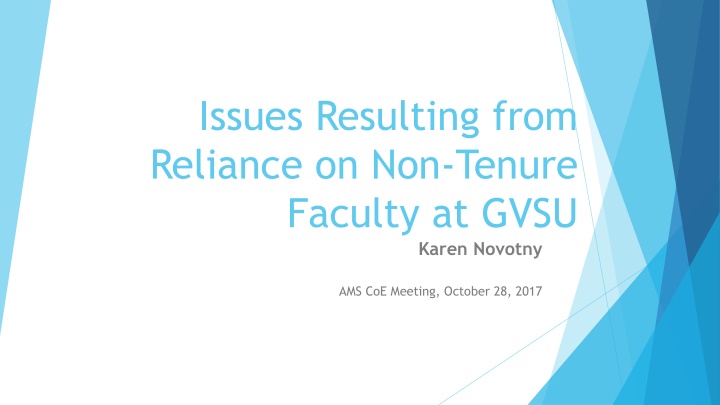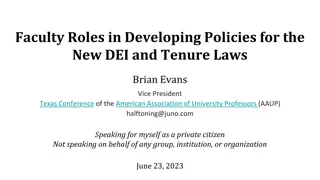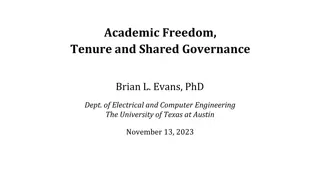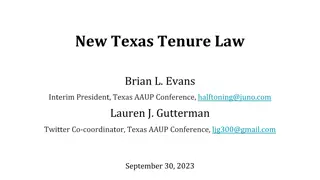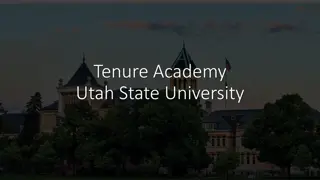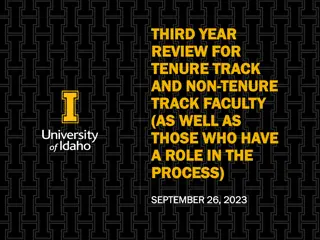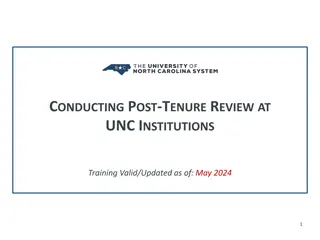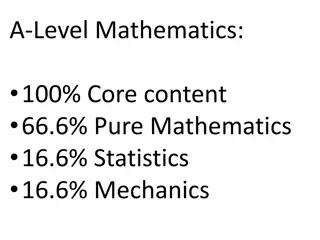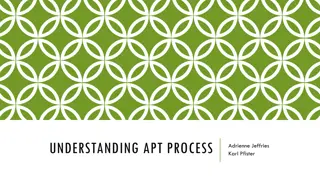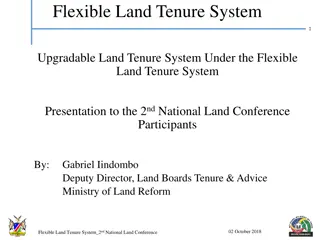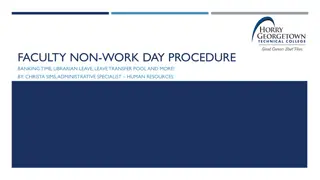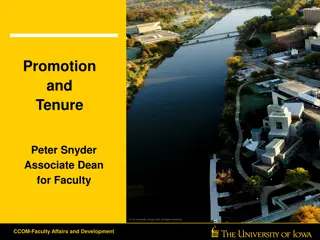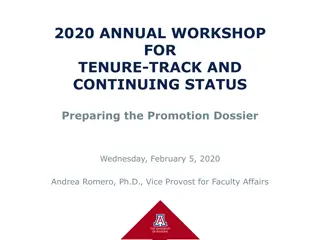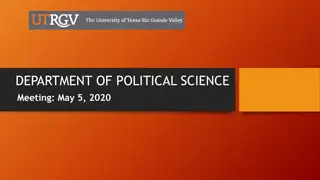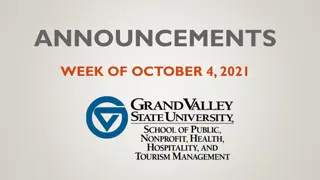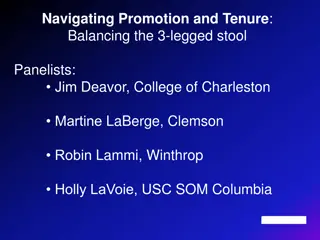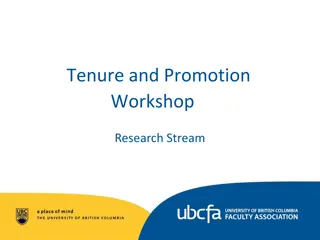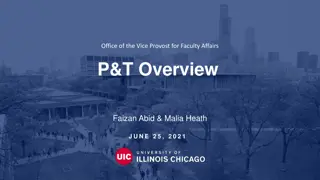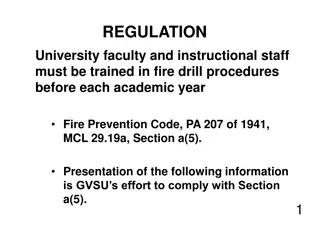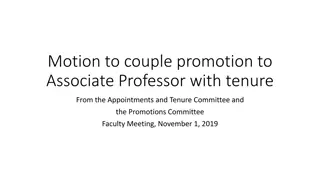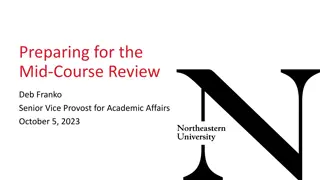Issues with Non-Tenure Faculty at GVSU Mathematics Department
Grand Valley State University relies heavily on non-tenure faculty in its Mathematics Department, leading to concerns about workload distribution and benefits provided to these instructors. The department's structure, contract terms, workload expectations, and faculty demographics all contribute to the challenges faced.
Download Presentation

Please find below an Image/Link to download the presentation.
The content on the website is provided AS IS for your information and personal use only. It may not be sold, licensed, or shared on other websites without obtaining consent from the author.If you encounter any issues during the download, it is possible that the publisher has removed the file from their server.
You are allowed to download the files provided on this website for personal or commercial use, subject to the condition that they are used lawfully. All files are the property of their respective owners.
The content on the website is provided AS IS for your information and personal use only. It may not be sold, licensed, or shared on other websites without obtaining consent from the author.
E N D
Presentation Transcript
Issues Resulting from Reliance on Non-Tenure Faculty at GVSU Karen Novotny AMS CoE Meeting, October 28, 2017
Grand Valley State University General Information: Chartered in 1960 with 1963 Pioneer Class of 226 Students Located in Michigan s 2ndlargest metropolitan region with main campuses in Allendale & Grand Rapids 22ndyear as one of America s 100 Best College Buys Accredited by the Higher Learning Commission (HLC), North Central Assoc. Current Students: 21,937 Undergraduates 60% female 39% first-generation college students 89% full-time 82% white
Mathematics Department Faculty 30 Tenured & 5 Tenure-track 17 Professors 12 Associate Professors 5 Assistant Professors 1 Instructor (on phased retirement) 10 Mathematics Educators & 25 Mathematicians 13 Affiliates (full-time contract faculty) 6 Visitors 16 Part-time Adjuncts (22 in Fall 2016) Total of 70 & half are contract faculty!
Contract Faculty Affiliates: Initial 1-year contract with subsequent 3-year contracts $500 annual travel/technology funds available Annual raises (merit based) Medical & retirement benefits Free tuition & dependent half-price tuition Visitors: Single AY contracts with 3 year maximum Medical benefits only Part-time Adjuncts: Single semester contracts No benefits
Mathematics Department Workloads Tenured/TT Faculty: Standard teaching load of 18 credit hours per AY Scholarship and service baseline expectations for all 6 hours significant focus in teaching, scholarship, or service Affiliates: Teaching load of 24 30 credit hours per AY Some teaching professional development expected No scholarship expectations Service is compensated with lower teaching load Visitors: Teaching load of 24 credit hours per AY Part-Time Adjuncts: Teaching load maximum of 9 credit hours
Mathematics Department Fall 2017 Data Majors: Elementary Ed: 106 students (94 female & 12 male) Secondary Ed: 83 students (48 female & 35 male) Non-certification: 124 students (63 male & 61 female) Courses: Foundations: 6 courses, 104 sections Mathematics Education: 7 courses, 13 sections Service courses for CS & Engineering: 3 courses, 7 sections Required & Elective Mathematics Major courses: 17 courses, 61 sections
Data by Faculty Type Part-Time Adjunct 16 Affiliates & Visitors 19 Tenured/TT Total 35 Number of Sections 32 74 73 179 17.9% 41.3% 40.8% Number of Students 845 2025 1615 4485 18.8% 45.2% 36% Number of Student Credit Hours 3052 7248 5999 16299 18.7% 44.5% 36.8%
Tenured/TT Faculty Presence Matters in All Courses Tenured/TT faculty establish relationships with their students that Increase student retention and satisfaction.* Positively impact math majors success in and completion of the major.+ Because tenured/TT faculty do research, they understand authentic mathematical experiences better than other faculty who have never engaged in research. *National Survey of Student Engagement. (2013). A Fresh Look at Student Engagement Annual Results 2013. Bloomington, IN: Indiana University Center for Postsecondary Research. +Micari, M. & Pazos, P. 2012. Connecting to the professor: Impact of the student-faculty relationship in a highly challenging course. College Teaching. 60 (2), 41-47. DOI: 10.1080/87567555.2011.627576.
Foundations Courses Many students of color are placed into Foundations courses, so these courses are ideal for recruiting students from underrepresented groups into the major. Approximately 1/3 of the students who intend to major in math at GVSU begin in Foundations courses. Foundations courses are often taught by part-time adjuncts who don t teach every semester and visitors who rarely stay even the maximum of 3 years. Many graduates only college mathematics courses are Foundations courses, so they need authentic mathematical experiences.
Calculus Courses are Important, Too! The first courses in the major are the calculus courses. Calculus students interested in STEM fields can be recruited into the major. So, for reasons similar to those expressed for Foundations courses, tenured/TT faculty NEED to also teach a large percentage of the calculus courses, but Only PhD mathematics are qualified to teach the upper level mathematics courses, and There aren t enough tenured/TT faculty!
Faculty Development in Teaching The GVSU Mathematics Department has high teaching standards for everyone including expectations for Active learning in all courses. Effective use of technological tools to improve student understanding. Using effective assessments. Providing authentic mathematical experiences. All faculty need mentors and guidance to grow as teachers.
Service Overload!!! Someone has to Mentor new part-time adjuncts, affiliates, and visitors. Make class visits to contract faculty. Evaluate contract faculty for continuation or raises. Provide training and activities to make sure contract faculty are teaching in a manner consistent with departmental standards. Even experienced affiliates and part-time adjuncts aren t expected to provide such service, so it falls to tenured/TT faculty who often aren t even teaching the same classes.
Part-Time Adjuncts are Scarce The Higher Learning Commission requires one of the following to teach any course for which students receive college credit: A Master s degree in Mathematics, A Bachelor s degree in Math, a Master s degree in a related field, and at least 18 graduate level credits in Mathematics, or At least 3 years of experience in the field, which doesn t include teaching. Many of our long-term part-time adjuncts do not satisfy these requirements, so they can only teach Beginning Algebra (MTH 097). Community Colleges pay more.
The 3 Main Issues: Without more tenured/TT faculty, Foundations and Calculus classes MUST be taught primarily by contract faculty, who aren t trained in advising, have no long-term commitment to GVSU (other than Affiliates), and are unlikely to establish those important student-faculty relationships. We all mentor and support new TT faculty & we share the service load. But now there s more work without more workers! Supply & Demand: It s hard to find qualified part-time adjuncts given the low pay and ACA restriction on the number of credit hours they can teach.
Thank You! Other issues? Questions/Comments? Contact me for further information : Karen Novotny, Professor & Chair Department of Mathematics novotnka@gvsu.edu
